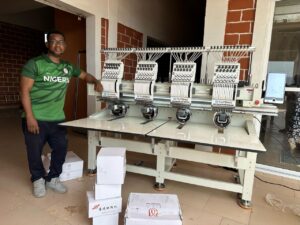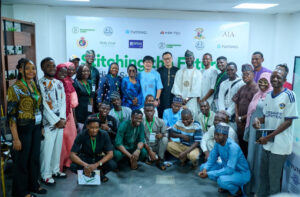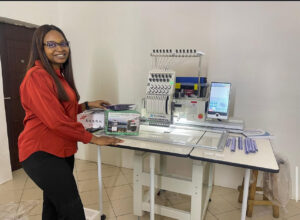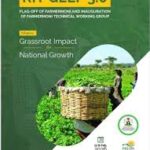By Tosin Kolade, News Agency of Nigeria (NAN)
Nigeria’s effort to combat high youth unemployment is receiving a boost with the emergence of innovative solutions.
One of such initiatives is embroidery, not just as a cultural craft, but as a tool for economic empowerment and job creation.
Mr Lukman Abdulsalam, an entrepreneur and embroidery expert, is spearheading efforts to transform the trade into a structured, income-generating sector.
He believes embroidery can move beyond aesthetics to become a key contributor to Nigeria’s Gross Domestic Product (GDP).
At a recent exhibition in Abuja, Abdulsalam unveiled plans to establish embroidery hubs across 10 states.
According to him, each hub will be equipped with 50 machines and is expected to create more jobs in each state, targeting unemployed youth and aspiring fashion entrepreneurs.
The initiative has attracted the attention of the Office of the President.
Ayinde Adamson, the Senior Special Assistant to President Bola Tinubu on Industrial Training and Development, has pledged government’s support, including subsidies for embroidery machines and provision of technical training.
He explained that producing an agbada design typically costs between N18,000 and N25,000, while a kaftan costs between N8,000 and N12,000.
According to him, this means a tailor could earn at least N600,000 in a week.
Instead of charging customers high fees, he said a government partnership could allow each trained user to rent a tailoring machine for one week at a discounted rate of N100,000.
“The user would keep all earnings made during that week after paying the rental fee”.
He stressed that such collaboration would give more people access to the machines at affordable rates.
He believes this will reduce entry barriers and encourage more young Nigerians to take up the skill.
“When we empower the youth, we give them the opportunity to generate income, improve their lives, and contribute to the national economy,” he said.
Abdulsalam’s optimism is backed by global trends.
 In the U.S., the embroidery services market is valued at 0.48 billion dollars as of 2024, with a projected compound annual growth rate (CAGR) of 2.9 per cent through 2034 (Prophecy Market Insights).
In the U.S., the embroidery services market is valued at 0.48 billion dollars as of 2024, with a projected compound annual growth rate (CAGR) of 2.9 per cent through 2034 (Prophecy Market Insights).
This growth is driven by increasing demand for custom apparel, corporate branding, home textiles, and niche crafts.
Meanwhile, in India, more than 200,000 artisans are engaged in embroidery, contributing billions of dollars in revenue.
Notably, states such as Gujarat and West Bengal have successfully transformed traditional styles like Zardozi and Kantha into major export commodities.
Similarly, in Pakistan, embroidery plays a significant role in supporting textile exports and household incomes, especially in the regions of Punjab and Sindh.
In contrast, China has taken a more industrialised approach by adopting advanced computerised machines, thereby cementing its status as a global leader in embroidery technology.
Across Europe, the sector continues to thrive at the premium end of the market.
For example, Germany recorded a 22 per cent increase in embroidery kit production, while Italy produced over 14.5 million embroidered bridal garments in 2023 (Market Growth Reports).
Furthermore, demand for personalised apparel is rising steadily in the West.
A report by the Financial Times indicates that brands such as With Nothing Underneath and O Pioneers experienced a 93 per cent growth in in-store embroidery services within a single year
According to the Nigerian Export Promotion Council, the fashion industry in Nigeria is currently valued at more than 10 billion dollars.
However, embroidery remains underdeveloped.
In 2023, Nigeria exported only 249,000 dollars’ worth of embroidery products, while importing nearly 110 million dollars, mainly from China, Austria, Switzerland, India, and Thailand, the he Observatory of Economic Complexity reports.
Encouragingly, the local embroidery sector is projected to grow significantly from 50 million dollars in 2025 to nearly 138 million dollars by 2033, Cognitive Market Research indicates.
On a continental scale, Africa’s cotton embroidery market is also poised for expansion.
According to IndexBox, by 2035, it is expected to reach 12,000 tonnes, valued at approximately 259 million dollars, spurred by rising demand for both traditional and contemporary styles.
Drawing inspiration from these models, Abdulsalam, now known as the “Embroidery Chief”, has attracted international interest.
It may be recalled that Abdulsalam’s journey into embroidery began out of necessity.
A graduate of Electrical and Electronics Engineering from the University of Ilorin, he struggled to secure a white-collar job after graduation.
With no startup capital, he taught himself embroidery and gradually built a business that now employs several others.
He credits his success to access to information and the willingness to learn.
“What you need to explore life is information, because without it, money is useless.
“Young people must learn to identify the gaps in their communities and find ways to fill them with their skills,” he said.
 At the Abuja exhibition, Mr Michael Zu, a senior sales executive from a Chinese embroidery machine company FUTONG, announced a partnership to invest in Nigeria’s growing embroidery ecosystem.
At the Abuja exhibition, Mr Michael Zu, a senior sales executive from a Chinese embroidery machine company FUTONG, announced a partnership to invest in Nigeria’s growing embroidery ecosystem.
Futong is a manufacturer of embroidery machines, while Dahao is a global leader in embroidery software and computing systems.
Zu said that while embroidery had long existed in Nigeria, it remained largely informal and unstructured.
His company plans to support the initiative not only by supplying machines, but also by providing training, digital design software, and technical support.
“This market is important; it has potential and that is why we are here,” Zu said.
Earlier, Managing Director/CEO of Futong, Steven Xu, announced the company’s partnership with Embroidery Chief as its exclusive distributor in Africa.
Xu said the alliance would bring high-quality, innovative embroidery machines closer to Nigerian entrepreneurs, helping them boost productivity and compete globally.
He noted that Futong machines are designed for precision, speed, and durability, with strong after-sales support and training to ensure users’ success.
Xu added that the collaboration with Embroidery Chief and global software giant Dahao would drive automation, sustainability, and growth in Africa’s embroidery industry.
The proposed embroidery hubs will also include hands-on training in digital design to bridge the gap between traditional craftsmanship and modern technology.
This aligns with the federal government’s push to strengthen Micro, Small and Medium Enterprises (MSMEs), which account for about 96 per cent of Nigerian businesses and contribute nearly 49 per cent to the GDP, according to the National Bureau of Statistics.
However, MSMEs in Nigeria often struggle with limited access to finance, equipment, and technical skills, barriers the embroidery initiative seeks to address.
With more than 60 per cent of Nigeria’s population under the age of 25, experts say youth-focused solutions are crucial to reducing unemployment.
The fashion and creative sectors, in particular, have shown strong potential for growth.
 According to the African Development Bank (AfDB), Africa’s creative industries could generate more than 15 billion dollars in annual revenue if adequately developed; an opportunity Nigeria is well-positioned to tap.
According to the African Development Bank (AfDB), Africa’s creative industries could generate more than 15 billion dollars in annual revenue if adequately developed; an opportunity Nigeria is well-positioned to tap.
Growing global demand for bespoke fashion and handmade embellishments is also opening new markets.
Brands in the UK, Italy, and the U.S. are increasingly embracing embroidery as a symbol of luxury and authenticity.
A 2023 report by Allied Market Research projects that the global embroidery machinery market will exceed 5 billion dollars by 2032, with major contributions expected from developing countries.
In spite of this, many Nigerian artisans lack access to electricity, formal training, and digital tools, challenges that limit their competitiveness.
Abdulsalam’s initiative aims to change that.
Civil society groups are also backing the idea.
Connected Development, a leading non-governmental organisation, has called on the Federal Government to integrate embroidery into existing youth empowerment and skill acquisition programmes.
The organisation believes such efforts will promote economic inclusion and reduce youth restiveness.
Also, the Small and Medium Enterprises Development Agency of Nigeria (SMEDAN) continues to play a pivotal role in nurturing Nigeria’s fashion and creative industries by supporting small-scale designers, tailors, and artisans across the country.
The agency has unveiled various skill acquisition programmes aimed at empowering youth and women with fashion-related skills, including tailoring, garment production, pattern drafting, and business management.
These programmes are often accompanied by starter kits, mentorship opportunities, and access to micro-credit facilities to help beneficiaries scale their businesses.
Through its zonal and state offices, SMEDAN also facilitates market linkages and exhibitions, providing local designers with platforms to showcase their work and attract buyers and investors.
SMEDAN Director-General, Mr Charles Odii, recently reiterated the agency’s commitment to repositioning Nigeria’s fashion industry as a viable contributor to economic growth.
He said SMEDAN was working with stakeholders to formalise the sector, improve access to modern equipment, and integrate digital literacy and e-commerce training for fashion entrepreneurs.
“Nigeria’s fashion industry has the potential to generate significant employment and revenue if properly harnessed; we are creating an enabling environment for young talents to thrive,” he said.
With plans underway to roll out embroidery hubs in 10 states, stakeholders are hopeful that the initiative could reposition embroidery as a vital part of Nigeria’s creative economy.
Supported by government partnerships, private investment, and targeted training, they say embroidery has become a symbol of resilience, and a sustainable path to youth empowerment. (NANFeatures)
***If used, please credit the writer and the News Agency of Nigeria.












